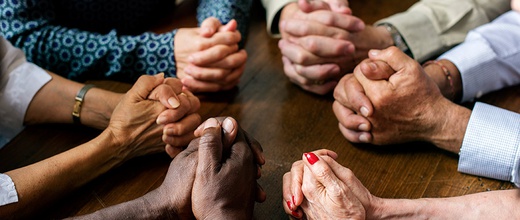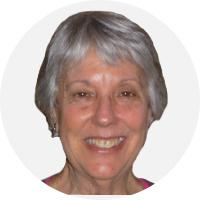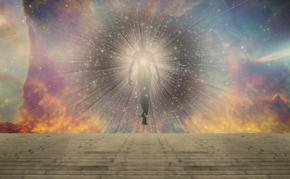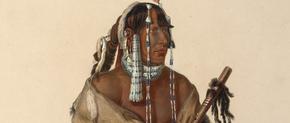The views expressed in our content reflect individual perspectives and do not represent the authoritative views of the Baha'i Faith.
When you hear or read the word “Parliament,”what comes to your mind?
Before I got involved in the World Parliament of Religions (WPOR), I thought that word referred to a form of government—for example, the elected body we have where I live in Canada. However, as I’ve recently learned, the word “parliament” comes from the Old French word “parlement,” which comes from the root word “parler,”—in English, “to speak.”
Now, midway through the WPOR here in Toronto, I can confirm that speaking is indeed a large part of this event. Beyond that, the program features a week of performances, videos, book readings, dramatizations, visual displays, and other celebrations of the arts. The World Parliament of Religions has immersed me in a swirl of activity, surrounded by people in a dazzling array of different dress and speaking in many languages. With so much going on, I am deciding what to attend among many options every hour. My head and heart are full, as well as dazed and even confused at times.
As is often the case at conferences, some of the best conversations, connections and moments of insight happen between the scheduled events. I have met people from at least a dozen countries and scores of Faiths, each committed to interfaith cooperation, living the principles of their own religion, and making a positive contribution to the future of our planet and its creatures. Some of these casual conversations have been brief, some lengthy, and some leading to promises of ongoing contact even after the WPOR closes for this year.
Quotations such as this one by Abdul-Baha, son of Baha’u’llah, the Founder of the Baha’i Faith, describe those connections well:
In reality all are members of one human family—children of one Heavenly Father. Humanity may be likened unto the vari-colored flowers of one garden. There is unity in diversity. Each sets off and enhances the other’s beauty. – Divine Philosophy, p. 25.
The Historical Significance of the World Parliament of Religions
Most historians trace the roots of the modern interfaith movement to the first WPOR in 1893—the first time in human history when representatives from the world’s great Faiths came together in one place. Prior to that time, the typical view of religion in the West recognized only one “universal” Faith: Christianity. Individuals and journalists commonly labeled other Faiths as “local,” “indigenous,” or even as “cults.” Fortunately, that antiquated view has shifted dramatically, consistent with the universality of the Baha’i teachings.
I believe that Baha’u’llah’s message of unity in the middle of the 19th Century provided the inspiration, will, and energy for humanity’s forward progress; and I see the emergence of today’s interfaith movement as having its roots in that same message. Indeed, everything in the world received an impulse toward unity, even as proclaimed in these words by Baha’u’llah:
The world’s equilibrium hath been upset through the vibrating influence of this most great, this new World Order. Mankind’s ordered life hath been revolutionized through the agency of this unique, this wondrous System—the like of which mortal eyes have never witnessed. – Baha’u’llah, The Most Holy Book, p. 85.
How is this manifested? We need to look no further than people’s interest in other religions, awareness of world news, scientific discoveries, technological achievements, and social progress. Of course none of this occurs uniformly everywhere around the world, but the general trend is undeniable. For example, within just a few years of Baha’u’llah proclaiming his message of unity, leaders in religion, education, literature, philosophy, and other fields of thought also began discussing and taking concrete steps toward global unity. As history clearly indicates, the WPOR is one tangible outcome of this trend.
Interfaith as a Movement
The WPOR, conceived as a vehicle for dialogue among religions, has now become a celebration of faith, culture, and humanity at its best. Many sessions are offered, not just by one Faith, but hosted and presented by members of several faiths working together. I see this as a shift from mere curiosity and tolerance to enthused cooperation and collaboration.
Interfaith outreach, firmly embedded in the Baha’i teachings, continues today through local, regional, and international practices. To further explore this unmistakeable trend, the Universal House of Justice said, in a major message to the world’s religious leaders published in 2002:
As the twentieth century opened, the prejudice that seemed more likely than any other to succumb to the forces of change was that of religion. In the West, scientific advances had already dealt rudely with some of the central pillars of sectarian exclusivity. In the context of the transformation taking place in the human race’s conception of itself, the most promising new religious development seemed to be the interfaith movement. … By the time the century ended, interfaith worship services, unthinkable only a few decades earlier, were becoming commonplace. – To the World’s Religious Leaders, p. 3.
We now see evidence of the interfaith movement not only in special events such as the WPOR but in our own communities and daily lives. Sometimes labeled “interfaith,” sometimes “multifaith,” and sometimes “multicultural,” these groups and their work celebrate diversity and explore ways to be more unified.
Diversity of Topics Included at WPOR
The first WPOR program in 1893 largely confined itself to speakers greeting others, telling the history of their Faith, and defining their core beliefs. Considering the background of the 7000 individuals then in attendance and the times in which they lived, few would have had intimate familiarity with most other belief systems.
Here we are, 125 years later, and things have changed dramatically. Although I am no expert in all of the Faiths present, I am not surprised by someone talking about Hinduism or Jainism, for example—in contrast to the situation in 1893.
Here at WPOR, 2018 obviously looks like a very different world from 1893. When I read the list of event themes and the presentations each day, I see a reflection of the challenges of our times. Indeed the program is consistent with this advice from Baha’u’llah:
Every age hath its own problem, and every soul its particular aspiration. The remedy the world needeth in its present-day afflictions can never be the same as that which a subsequent age may require. Be anxiously concerned with the needs of the age ye live in and center your deliberations on its exigencies and requirements. – Gleanings from the Writings of Baha’u’llah, p. 213.
I am feeling enriched, illumined, and more informed through this experience. If I were to go home today and tell even a few people about it, perhaps that would be enough. On the other hand, I am attending WPOR in anticipation of action as an outcome—I want to do more to bring the world’s religions and their followers together in unity. In the words of Baha’u’llah: “Let deeds not words be your adorning.” – The Hidden Words, p. 23.
What could those actions be? I don’t know yet, but in the next (and final) installment of this series let’s explore that idea.

















Comments
Sign in or create an account
Continue with Facebookor